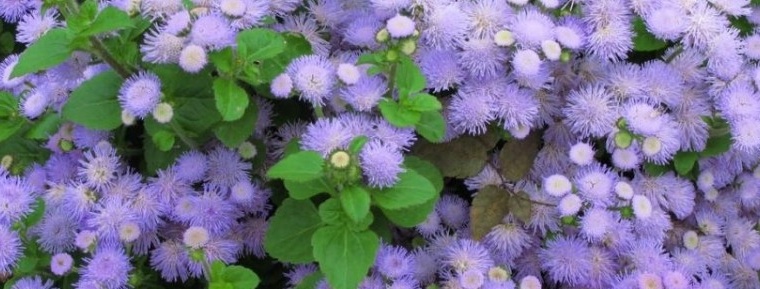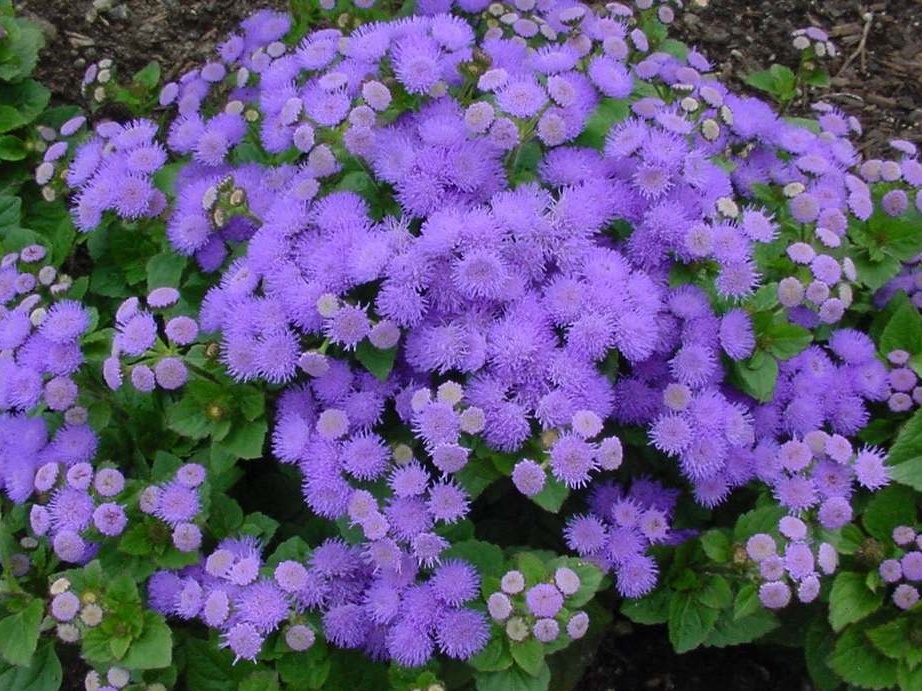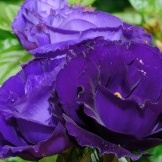Awesome Ageratum: Plant Care
In the genus of asters, agertum has become another popular plant for landscape design. This flower grows in East India, as well as in Central and North America.
Translating the name from Latin sounds like "ageless." This is due to the fact that after cutting, the flowers will remain fresh for a long time. The second name of the plant is "long-flowered". It gained distribution in Europe in the 19th century.
Fluffy flower pompons make up inflorescences of different shades of blue. Today, there are more than 60 varieties of this flower. Among them, the most popular are small shrubs on which oval, rhomboid or triangular leaves grow. The color is bright green, and the edges are jagged.
The arrangement of the upper leaves is regular, while the middle and lower leaves are opposite. The bush itself consists of many pubescent stems directed vertically. Usually they grow to a height of 60 cm.
Small flowers have a fragrant aroma. Inflorescences reach up to one and a half centimeters in diameter. They look like dense flap elements. In addition to shades of blue, you can find purple, pink and white flowers.
Achene - the fruit of a plant - has an elongated pentagonal shape. One gram of achene accounts for about seven thousand seeds. You can store them for a long time up to 4 years.
Ageratum is characterized by heat lovingness; therefore, in cold climatic conditions it is grown as an annual. In landscape design, ageratum is most often used for carpet compositions.
In combination with this plant, snapdragon, calendula, marigolds and other annual plants look great.
Popular varieties of ageratum
Among the most famous and commonly used varieties of ageratum can be distinguished:
- Alba
- Azur Pearl
- Faye Pink
- Blue Mink
- Blue Bouquet
- Sortogruppa "Hawaii"
- Bayern
White Ageratum is characterized by dense inflorescences. In comparison, blue ageratum has larger inflorescences. Faye Pink has a dark pink color. The inflorescences of this variety are loose and have a diameter of up to 5 cm. The height of the bush reaches 30 cm.
"Blue Mink" is characterized by a lilac shade on a blue background. Large leaves grow on the stems, and the height of the bush reaches 30 cm. "Blue Bouquet" grows to 45 cm in height. It has an unusual deep shade of blue.
Varieties "Hawaii" may have purple or white flowers. All varieties of this category are dwarf and reach only 18 cm. Bavaria will grow to 30 cm. In this case, the inflorescences can have two colors from bright blue to white.
Planting Ageratum
There are several ways to propagate ageratum. The most common is the removal of plants from seeds. The second half of March is most suitable for this.
A composition of humus, peat, sand in equal parts is placed in a special box. Seeds are poured into this mixture and covered with a thin layer of the same composition. All of this is covered with a glass plate. Alternatively, a film can be used.
At first, such a greenhouse is kept in a place where the temperature does not drop below 15 grams. Every day you need to raise the glass and ventilate the boxes. As the surface dries, it should be sprayed with water.
The first shoots usually appear within two weeks. As soon as they appear, the cover can be removed from the box.
When the first leaves appear at the seedlings, it should be placed more spacious. Such a transplant should be performed twice. The second time, each sprout should be moved to a separate glass or pot.
Care should be taken to keep the soil moist and the air around the plants dry. It is better to water the seedlings in the morning. Before planting in about 14 days, plants need to be moved to open air. Thus, acclimatization will take place.
Planting in the soil can only be carried out when the last frost has passed. The landing area must be protected from the wind. Bright sunshine is welcome, as in the shade the ageratum turns into long shoots that will not bloom.
It is important that the soil is well drained. Light and non-acidic soil should nourish the bushes well. In any case, the ageratum is unpretentious and will easily transfer some deviations from recommendations.
Each sprout is placed in a separate hole, each of which is located at a distance of 15 cm from the previous one. The first flowers should appear in two months.
Easy Agrate Care
The care of this plant is standard:
- watering;
- loosening;
- weeding;
- top dressing.
Watering the agratum should be plentiful, but neat. Excess fluid is best avoided. During irrigation, loosening and weeding can be carried out. Weed removal is an important process for growing a healthy plant.
Mineral fertilizers are used to feed plants. An alternative will be humic compounds. Mullein can also be used. Fresh manure should be deleted from the list of suitable fertilizers. For an ageratum, it is destructive.
An overfed plant will not bloom profusely. From it it will be possible to achieve only lush greenery. Wilted inflorescences must be removed on time. With regular pruning, ageratum flowers will be lush and vibrant. When pruning, only a few internodes should be left on the stem.
To preserve the most beautiful specimens, you can transplant them into pots and bring them into the house or on the veranda for the duration of frosts. After they decorated the lawn, they can still serve to ennoble the interior.
Ageratum is an excellent plant for keeping it in a flower bed or in a house. With proper and timely care, bright bushes will decorate any site.


















































